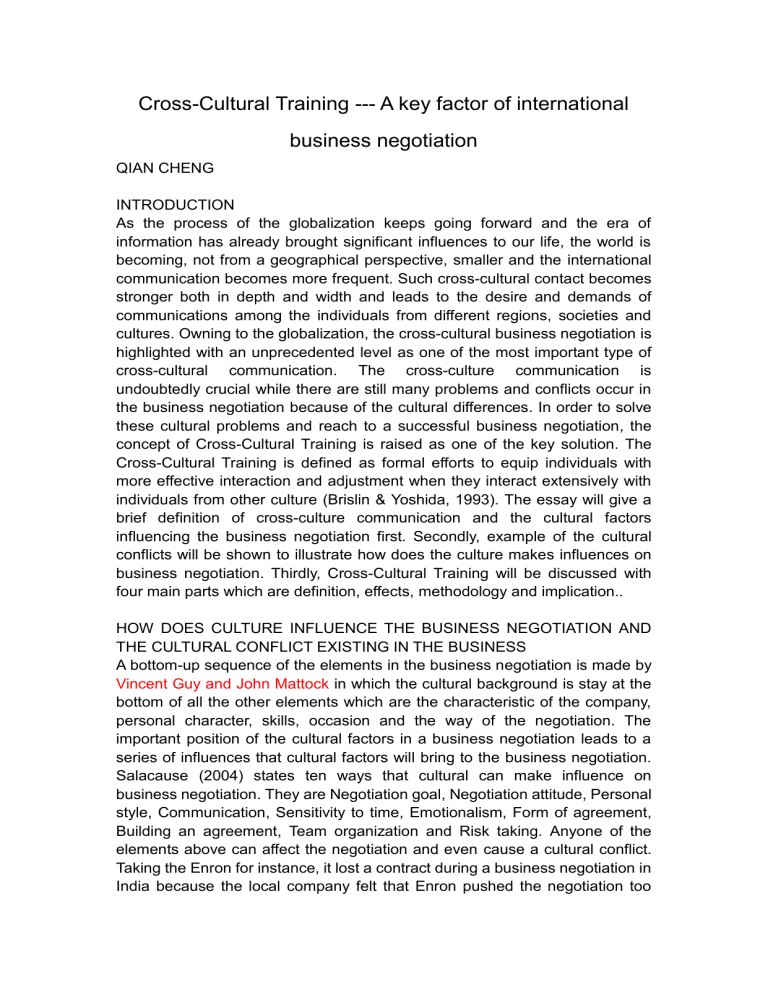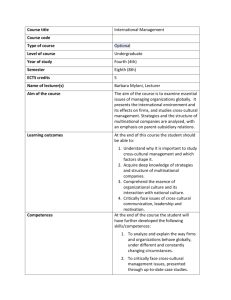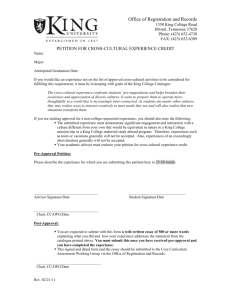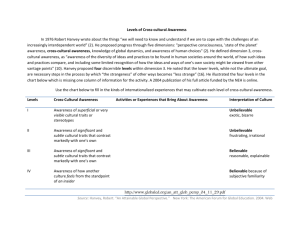Project of PSB Second Draft

Cross-Cultural Training --- A key factor of international business negotiation
QIAN CHENG
INTRODUCTION
As the process of the globalization keeps going forward and the era of information has already brought significant influences to our life, the world is becoming, not from a geographical perspective, smaller and the international communication becomes more frequent. Such cross-cultural contact becomes stronger both in depth and width and leads to the desire and demands of communications among the individuals from different regions, societies and cultures. Owning to the globalization, the cross-cultural business negotiation is highlighted with an unprecedented level as one of the most important type of cross-cultural communication. The cross-culture communication is undoubtedly crucial while there are still many problems and conflicts occur in the business negotiation because of the cultural differences. In order to solve these cultural problems and reach to a successful business negotiation, the concept of Cross-Cultural Training is raised as one of the key solution. The
Cross-Cultural Training is defined as formal efforts to equip individuals with more effective interaction and adjustment when they interact extensively with individuals from other culture (Brislin & Yoshida, 1993). The essay will give a brief definition of cross-culture communication and the cultural factors influencing the business negotiation first. Secondly, example of the cultural conflicts will be shown to illustrate how does the culture makes influences on business negotiation. Thirdly, Cross-Cultural Training will be discussed with four main parts which are definition, effects, methodology and implication..
HOW DOES CULTURE INFLUENCE THE BUSINESS NEGOTIATION AND
THE CULTURAL CONFLICT EXISTING IN THE BUSINESS
A bottom-up sequence of the elements in the business negotiation is made by
Vincent Guy and John Mattock in which the cultural background is stay at the bottom of all the other elements which are the characteristic of the company, personal character, skills, occasion and the way of the negotiation. The important position of the cultural factors in a business negotiation leads to a series of influences that cultural factors will bring to the business negotiation.
Salacause (2004) states ten ways that cultural can make influence on business negotiation. They are Negotiation goal, Negotiation attitude, Personal style, Communication, Sensitivity to time, Emotionalism, Form of agreement,
Building an agreement, Team organization and Risk taking. Anyone of the elements above can affect the negotiation and even cause a cultural conflict.
Taking the Enron for instance, it lost a contract during a business negotiation in
India because the local company felt that Enron pushed the negotiation too
fast. In fact, the different sensitivity to time must contribute to the loss of the contract since for Enron
’s negotiator time is money, while for the businesspeople of India, the slower negotiations leads to the better and more trust in the other side (Salacause, 2004). The great diversity of the cultures worldwide makes it impossible for negotiators, no matter how skillful and experienced, to adapt well to all the cultures that may be faced.
CROSS-CULTURAL TRAINING IS A KEY FACTORSFOR A SUCCESSFUL
BUSINESS NEGOTIATION
As is showed in the example above, cultural conflicts may result in an unsuccessful business negotiation and some studies have found that the business negotiation between different cultures often fail because of problems related to cross-cultural differences (Black and Mendenhall, 1989). Such conflicts are probably led by cultural shock which is to describe the problems met by people who go from one culture to another (Bhawuk & Brislin, 2000).
Culture shock offered practitioners with a legitimate reason to provide cross-cultural training since it would result in the avoidance, if not elimination, of culture shock (Bhawuk & Brislin, 2000) and therefore improve the performance of the expatriates in business activity and negotiation. As Black and Mendenhall (1990) state, cross-cultural training designed for expatriation is helpful for expatriates to develop performance or learn appropriate behaviors to achieve better adjustment in foreign countries through observing and experiencing different cultures directly or indirectly (Hyoung Koo Moon,
Byoung Kwon Choi, Jae Shik Jung, 2012). If expatriates experience cross-cultural training, they will be easily available for information or knowledge on how to communicate and interact with people and on what the socially acceptable behaviors are in the host country (Black.,1991) . Therefore, expatriates can improve their cognitive and interpersonal skills on how to deal with cross-cultural business and negotiation (Littrell, Salas, Hess, Paley, and
Riedel, 2006). Taking the Cross-cultural Training before cultural interaction helps to relief the severity and duration of culture shock. An appropriately designed Cross-Cultural Training program can improve the adaption of the negotiator to the new cultural situation (Jie Shen* and Brant Lang, 2009). In
1983, Brislin raised the several cross-cultural training methodologies which then become popular: (1) fact-oriented training which is the most basis type of
Cross-Cultural Training in which based the trainees will be available to various facts or information about the culture of the host country (Black and
Mendenhall,1989); (2) attribution training, communicate with the culture assimilator to enable trainees to internalize values and standard of behavior of the host culture; (3) cultural awareness training, is to provide the expatriate deep understanding about the concept of culture and cultural differences through teaching awareness about the home culture (Christian Hånberg,
Gabriel Österdahl, 2009); (4) cognitive-behavior modification, to make trainees know about what activity is rewarding or punishing and thus they can focus on
the rewarding one and deal with the challenge better (Christian Hånberg,
Gabriel Österdahl, 2009); (5) experiential learning, to personally be a participant and learn about a specific host culture; and (6) interaction learning, is designed for trainees to feel more comfortable with host nationals and to understand life in the host country in details (Eschbach, Parker and Stoeberl,
2001). By taking Cross-Cultural Training, the businesspeople can improve their adjustment to a new cultural environment and thus they are able to not get cultural problems when they are involved in a cross-cultural business negotiation. People who receive the Pre-Cross-Cultural Training will do better in identifying the cultural elements of the host country such as the concept of time, values, characteristic of language and taboo, which can lead to a successful business negotiation without any misunderstanding and confusion.
Nevertheless, there are many companies being blind to the effect of the
Cross-Cultural Training because it needs money to be invested on and such investment will not be profitable in a short-term period of time. It is also doubted by many firms that the Cross-Cultural Training is useful during the training program but it actually does not work after the training program is completed since it may not practical enough. Blake and Heslin(1983), Blake et al.(1996), and kealey and Protheroe(1996) argued that the previous reviews hold a more favorable attitude toward the effectiveness of the Cross-Cultural
Training (Dan, Janet , Milton, 2003). Dan, Janet and Milton (2003) states that there is no proof leads to the ineffectiveness of the Cross-Cultural Training but it is shown that the Cross-Cultural Training are not effective in achieving all the objectives associated with Cross-Cultural Training in practice because the effect of the Cross-Cultural Training varies relying on the differences
(knowledge, behavior, etc) of the individuals.
Evaluation
Intercultural business deals not only cross nations, they also cross cultures.
Culture will leads to profound influences on individual
’s thoughts, communication, and behavior. It also affects the kinds of affairs they make and the way of their negotiation (Salacuse, 2004). Many enterprises refuse the
Program because of its extra requirement of money and unconspicuous effects. It is estimated by Birdseye and Hill (1995) that the direct cost of sending a businesspeople oversea may reach to $220,000 and the cost of such issues of American, for instance, may be as high as $2 billion annually
(Mark and Chet, 2001). According to the research conducted by Eschbach,
Parker and Stoeberl (2001), the cost of failed international business negotiation have been estimated up to $500,000 and Black and Mendenhall
(1990) and Walton (1990) estimated that the failure rates ranges from 20 per cent to 85 per cent. The results of the studies demonstrated that comprehensive cross-cultural training really reduce the time necessary to achieve sound adjustment and to attain cultural proficiency and shorten the time necessary to become effective and productive in the business negotiation
(Doris M. Eschbach, Gerald E. Parker and Philipp A. Stoeberl, 2001). It is the high cost and risk to reach to a successful intercultural negotiation that makes
Cross-Cultural Training the key solution for a successful intercultural negotiation and since Cross-Cultural Training is prove to be an effective way for the businesspeople to get better performance in international business negotiation, more and more companies should focus on the investigation and investment on the Cross-Cultural Training.
Reference
BLACK, J. S. & MENDENHALL, M. 1989. A Practical but Theory-based Framework for Selecting
Cross-Cultural Training Methods. Human Resource Management, 28, 511-539.
BLACK, J. S. & MENDENHALL, M. 1990. Cross-Cultural Training Effectiveness: A Review and a
Theoretical Framework for Future Research. Academy of Management Review, 15,
113-136.
BRANDL, J. & NEYER, A.-K. 2009. Applying cognitive adjustment theory to cross-cultural training for global virtual teams. Human Resource Management, 48, 341-353.
ESCHBACH, D. M., PARKER, G. E. & STOEBERL, P. A. 2001. American repatriate employees' retrospective assessments of the effects of cross-cultural training on their adaptation to international assignments. International Journal of Human Resource Management,
12, 270-287.
JIE, S. & LANG, B. 2009. Cross-cultural training and its impact on expatriate performance in
Australian MNEs. Human Resource Development International, 12, 371-386.
KOO MOON, H., KWON CHOI, B. & SHIK JUNG, J. 2012. Previous international experience, cross-cultural training, and expatriates' cross-cultural adjustment: Effects of cultural intelligence and goal orientation. Human Resource Development Quarterly, 23,
285-330.
MORRIS, M. A. & ROBIE, C. 2001. A meta-analysis of the effects of cross-cultural training on expatriate performance and adjustment. International Journal of Training &
Development, 5, 112.
OKPARA, J. O. & KABONGO, J. D. 2011. Cross-cultural training and expatriate adjustment: A study of western expatriates in Nigeria. Journal of World Business, 46, 22-30.
SALACUSE, J. W. 2005. Negotiating: The top ten ways that culture can affect your negotiation.
Ivey Business Journal, 69, 1-6.






